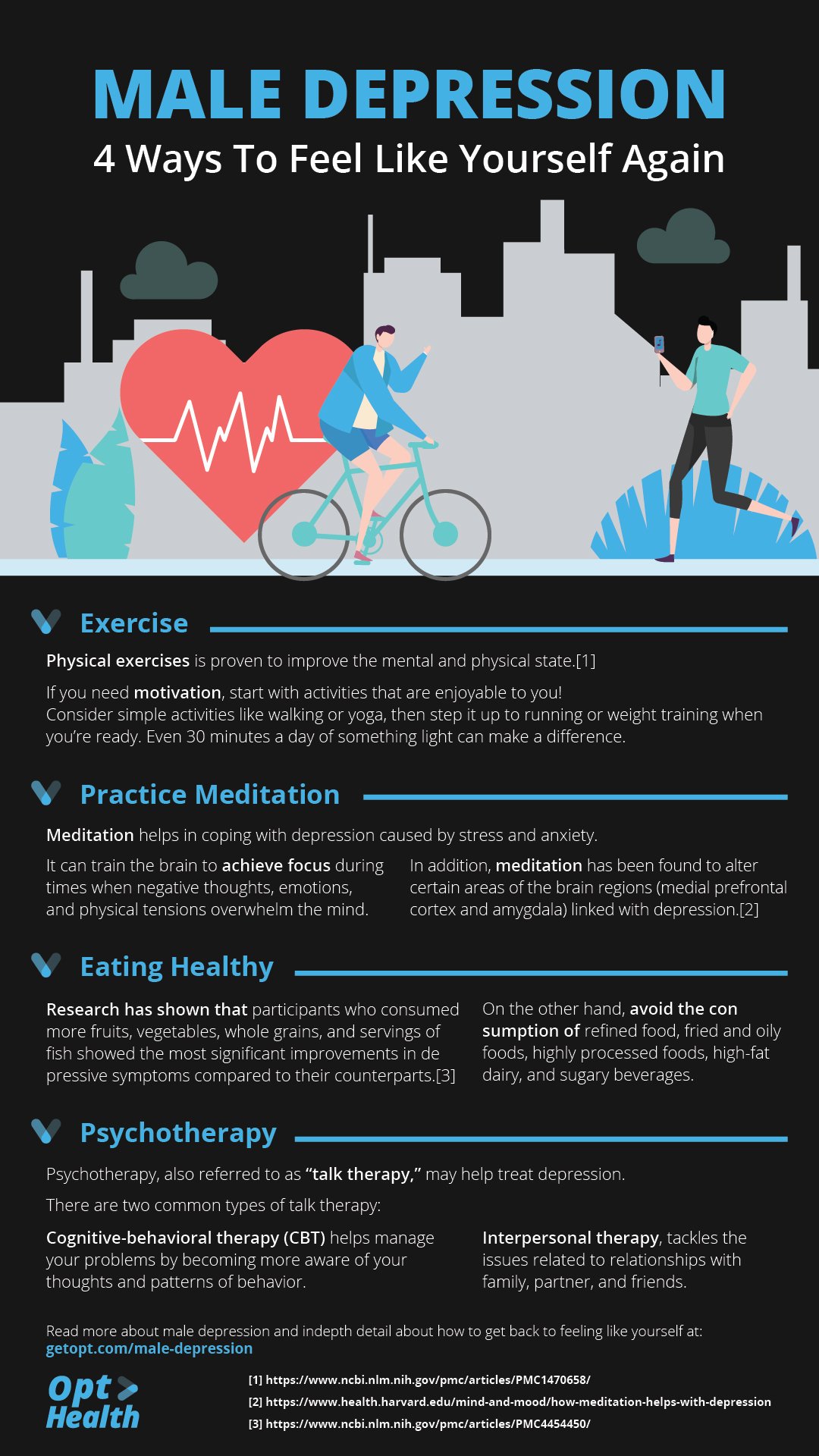
Hormone Health TRT

Male depression is a serious, but less talked about issue among men. Know more about the symptoms and ways to cope with depression.
Depression, or major depressive disorder, is a mood disorder that has negative effects on how a person thinks, acts, and feels. Depression is more than just feeling down. It interferes with daily tasks, inhibits performance, and puts a strain on the quality of life. Oftentimes, it is recurring and may last for weeks and even years if not treated.
Although women are more likely to develop depression than men, both sexes are susceptible to this illness. In fact, depression affects six million males in America alone each year.
Research suggests that certain chemicals cause depression in the brain, genetic factors, faulty mood regulations by the brain, medications, and stressful life events.
Depression affects people in different ways. Evidence supports that men and women show various symptoms and respond to treatment differently due to factors such as hormones and brain chemistry.
Both sexes share similar symptoms such as having trouble concentrating, feeling sad, low, tired, and guilty, sleeping too much or too little, overeating or eating less, and losing interest or enjoyment in pleasurable activities.
However, males may exhibit distinct behaviors that may indicate depression. For instance:
More often, depression in men goes undiagnosed due to different symptoms and because males tend to talk less and seek help. Male depression may take a toll on overall health and make you feel different from what you used to be. If you are suffering from the above symptoms, seeking professional help or making lifestyle changes is advisable.
Interested in learning about Sertraline side effects? Learn more today!
1. Psychotherapy
Psychotherapy, also referred to as “talk therapy,” may help treat depression.
There are two common types of talk therapy. One is cognitive-behavioral therapy (CBT) that helps manage your problems by becoming more aware of your thoughts and patterns of behavior. The second type is interpersonal therapy, which tackles the issues related to relationships with family, partner, and friends.
Talk therapy involves you talking while a trained counselor or therapist listens and addresses your problems.
Nowadays, talk therapy is not only limited to the doctor’s office. Sessions can be conducted over the phone, email, video calls, or mobile applications, making it more convenient for your needs and schedules.
Psychotherapy has been proven to be an effective treatment for depression. For more severe depression, antidepressant medications may be prescribed by your doctor.
Aside from therapy and medications, there are unconventional methods that you may also want to try to get you back to feeling like yourself again:
2. Exercise

Performing various physical exercises is proven to improve the mental and physical state. Staying active promotes positive body image and aids in coping with stress.
Finding motivation is one of the most challenging parts of doing exercises. You may start with activities that are enjoyable to you, be it in the form of sports such as rock climbing, running, or hiking.
Some forms of exercise, such as home workouts are more accessible and do not require equipment. Finding a workout that you can enjoy could positively impact your overall health and is more sustainable in the long run.
3. Practice Meditation
Meditation helps in coping with depression caused by stress and anxiety. One of the primary methods of meditation is by clearing your mind and focusing on the breath for a few minutes. It is natural for the mind to wander and think about random things in the process. The key is to recognize where your mind is and simply return your focus to your breath.
Practicing meditation trains the brain to achieve focus during times when negative thoughts, emotions, and physical tensions overwhelm the mind. In addition, meditation has been found to alter certain areas of the brain regions (medial prefrontal cortex and amygdala) linked with depression.
4. Eating Healthy

The stomach is referred to as the second brain for a reason. Research has shown that participants who consumed more fruits, vegetables, whole grains, and servings of fish showed the most significant improvements in depressive symptoms compared to their counterparts.
Include more nutritious foods in your diet, including fruits, vegetables, nuts, poultry, legumes, fish, and unprocessed meats. On the other hand, avoid the consumption of refined food, fried and oily foods, highly processed foods, high-fat dairy, and sugary beverages.
A shift to a healthy diet may significantly reduce the risk of depression and its symptoms while improving your overall health.
Depression is often paralyzing. It affects your ability to perform tasks and build healthy relationships. Although depression is recognized as a severe illness, it is treatable using antidepressant medications, professional help, and lifestyle changes.

Need more information on male depression? Get support and insight from top-tier physicians, completely available for you 24/7. Contact us today or leave a comment below!
Your health, your terms. Discover how personalized care can transform not just the way you feel, but how you live.